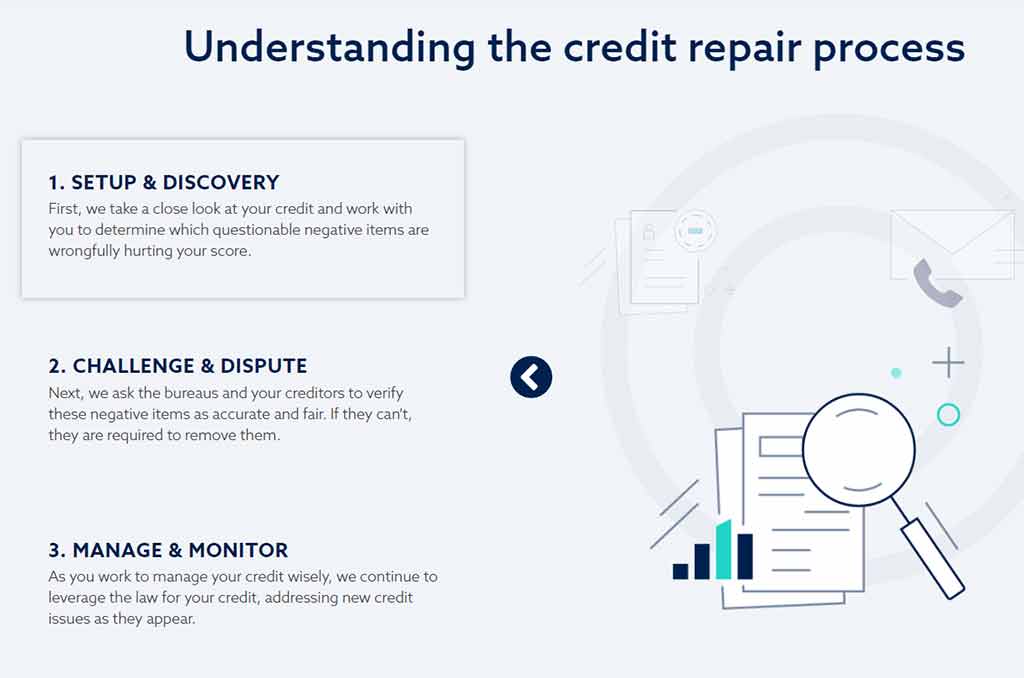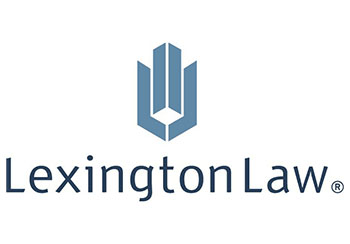Lexington Law
Trustpilot Rating – 2.9/5
With a star rating of 2.9 on Trustpilot and 4.3 on Google, it provides credit repair services by disputing any negative items in your interest. It has represented more than 9.8 million people since 2004. With three steps- finding negative items, verifying these negative items with creditors and leveraging law for credit.

One on One Counselling

Experienced Team

Free Educational Resources

24/7 Identity Theft Insurance
Lexington Law Firm is a credit repair company that claims to have removed over 77 million issues on its clients’ credit reports since 2004. When you work with Lexington Law, its team can challenge and dispute credit reporting errors on your behalf in an attempt to get these negative marks removed from your credit report. While this law firm might be able to work with you to improve your credit, however, there’s no guarantee that it can help.
This Lexington Law review will take a closer look at this credit repair company so you understand what services it provides, as well as where it falls short.
Lexington Law Firm Review: Just The Essentials
Lexington Law Firm has been offering credit repair services since 1991. Led by attorney-at-law John Heath since 2004, this company will reach out to the credit bureaus — TransUnion®, Experian®, and Equifax® — on your behalf to challenge and dispute inaccurate negative items and get them removed from your credit report.
According to a Consumer Reports investigation, more than one-third of Americans have found errors on their credit reports. By removing inaccuracies from your credit report, it could have a positive impact on your credit. A stronger credit score makes it easy to qualify for a loan, credit card, or other financial product.
It’s worth noting, however, that you don’t need to hire a third party to dispute errors on your credit report. You can do this yourself for free online or via mail. The Consumer Financial Protection Bureau (CFPB) offers useful instructions and a dispute letter template to guide you through the process. You can also order a free copy of your credit report from each of the three major credit unions at AnnualCreditReport.com.
While you don’t need to pay anyone to manage your credit, you might appreciate working with Lexington Law if you’re feeling too overwhelmed to deal with your credit yourself. Plus, the law firm might help you develop financial literacy skills so you can monitor your credit and deal with any issues that arise in the future.
At the same time, Lexington Law’s services are not a magic bullet. If a credit union determines that your credit report is accurate, you won’t see delinquent accounts or other red marks removed, and your credit will stay the same.
What Services Does Lexington Law Provide?
Lexington Law works with clients to help repair their credit. Specifically, the law firm will dispute any unverifiable or inaccurate items on your behalf. They will also provide access to an online dashboard to provide education on how you can build your score.
Some examples of activity that can drag down your credit score are accounts in collections, late payments, bankruptcies, repossessions, and foreclosures. Along with negotiating with the credit bureaus, Lexington Law can also address any harassing communications from collections agencies.

If you’re interested in working with Lexington Law, they will provide you with a free credit report consultation. If you decide to move forward with one of its services, you’ll start with a case setup and discovery call.
During this call, your consultant will take a close look at your credit to identify any questionable negative items. After this discovery call, the law firm will ask the credit bureaus and your creditors to verify these items as accurate. If they cannot, they will get removed from your credit report.
If you continue your monthly membership with Lexington Law, you can get help dealing with credit issues if any new ones arise. Lexington Law also offers a number of free resources on its blog to help you educate yourself about credit.
Lexington Law also offers some supplemental services, such as identity protection and personal finance tools.
How Much Does Lexington Law Firm Cost?
Lexington Law offers three levels of service, all of which charge a monthly fee.
- Concord Standard
Fee: $99.95 per month
On the Concord Standard plan, Lexington Law will submit disputes to the credit bureaus and creditors for you. This plan also includes “inquiry assist,” which is the law firm’s service of helping to remove hard credit pulls from your report if they’re not supposed to be there. Finally, this plan includes ID theft insurance, which can reimburse you if your identity gets stolen.
- Concord Premier
Fee: $119.95 per month
The Concord Premier offers everything on the Concord Standard, but it additionally provides ongoing credit monitoring and reports. Specifically, it helps you monitor your TransUnion report, though does not seem to provide insight from the other two credit bureaus.
- Premier Plus
Fee: $139.95 per month
Lexington Law’s highest-level plan is Premier Plus. Along with everything you get on the other two plans, you’ll also get access to your TransUnion FICO® Score, as well as Lexington Law’s cease-and-desist letters, lost wallet protection, personal finance manager, and junk mail reducer services.
Before you purchase this plan, it’s worth noting that you can alternatively purchase FICO® Score monitoring directly from myFICO.com starting at $19.95 per month. Alternatively, you can monitor your VantageScore credit scores for free with a service like Credit Karma.
Although lenders commonly rely on your FICO® Score when evaluating you for a loan, it usually aligns fairly closely with your VantageScore.
Understanding The 2019 Lawsuit Against Lexington Law
In 2019, the CFPB filed a lawsuit against Lexington Law claiming that it had misled consumers with exaggerated promises of credit repair. According to the suit, Lexington Law’s affiliate partners used deceptive advertising to get customers.
The CFBP alleges that Lexington Law’s marketing partners made up fake claims to promote its services. One excerpt says the following:
“Partners have used advertisements that included fake real estate ads, fake rent-to-own housing opportunities, fake relationships with lenders, false credit guarantees, and false and unsubstantiated statements about past consumer outcomes. The ads have also included false and unsubstantiated statements about consumers’ likelihood of success in obtaining products and services such as rent-to-own housing contracts, mortgages, or personal loans.”
The complaint also says that Lexington Law unfairly charges fees, saying that it shouldn’t charge customers anything until it has gotten them results. Lexington Law filed a motion to dismiss the lawsuit. As of March 2023, the case remains ongoing.
Pros of working with Lexington Law Firm?
Although Lexington Law can’t guarantee that it will repair your credit, there may be some potential benefits to working with them.
- Years of experience in the field
Lexington Law has been around since 1991, and it claims to have successfully resolved 77 million disputes on its clients’ credit reports since 2004. Its team consists of attorneys and paralegals, so you can likely feel confident that they know how to navigate the world of credit repair.
- One-on-one counseling
If you’ve been struggling to deal with your credit on your own, working with Lexington Law could give you the motivation you need. With Lexington Law, you’ll get a personalized consultation, review your credit report, and discuss the steps you need to take to move forward and improve your credit. Although you can review your credit reports on your own for free, sometimes sitting down with a professional can help you take action and break old habits.
- Educational resources
Lexington Law provides a number of educational resources, including lots of free articles on how to improve credit and avoid credit-damaging mistakes. Its Premier Plus plan also offers personal finance tools to help you manage your income and expenses.
- Identity theft insurance
As mentioned, some of Lexington Law’s plans include identity theft insurance. Lexington Law offers 24/7 identity theft monitoring, as well as identity theft insurance that offers up to $1 million reimbursement. If you sign up for this protection, you’ll also get real-time alerts about any unauthorized charges or other activity on your accounts.
Cons of working with Lexington Law Firm?
Although there may be some pros to working with Lexington Law, there are also some potential cons to consider.
- No guarantee of success
Lexington Law’s main way of helping consumers improve their credit is by getting errors removed from their credit report. The law firm will reach out to the credit bureaus, as well as your creditors, asking them to verify that the accounts are fair and accurate. If they can’t provide that verification, the credit bureaus are required to move the negative marks which can positively impact your credit.
However, your low credit score might not be a result of inaccurate reporting. If your accounts are there for a reason, they’ll stay on your credit report and you won’t see an improvement on your score until you take steps to improve your credit or enough time has passed that the negative marks fall off on their own. This usually takes seven years, though some marks, such as certain kinds of bankruptcy, can remain on your report for a decade.
- Monthly fees
When you work with Lexington Law, you’ll have to pay for its services on a monthly basis, with the cheapest plan starting at $99.95 per month. This fee might be burdensome if you’re dealing with financial challenges — especially for a service that may or may not fix your credit. And while Lexington Law says you can cancel your membership at any time,based off the previous month’s work performed you may or may not have a final invoice. You can cancel by calling 800-341-8441.
- Credit dispute services are ones you could do yourself
While Lexington Law has years of experience disputing credit errors, it doesn’t provide any magic solution that you can’t do yourself. As mentioned, you can review your own credit reports for free, as well as submit credit disputes to the credit bureaus.
To its credit, Lexington Law is upfront about this fact, stating:
“Anything a credit repair company does on your behalf, you can do yourself. But, deciding whether you want to DIY your credit repair or pay a service to help you requires some personal considerations.”
Lexington Law goes on to say that its credit repair services can save you time, as well as “pursue your case more aggressively than you may be willing or able to.”
While paying for credit repair services could make sense for some consumers, it’s important to note that you can dispute issues on your own.
- Mixed Lexington Law Firm reviews from customers
As of March 2022, this company has a fairly low rating of 1.82 out of 5 stars based on 377 Lexington Law reviews from customers on the Better Business Bureau.
One customer called the company deceptive and unethical, claiming it charged an extra fee of $114.95 after they canceled their subscription.
Another said the company was misleading and untruthful, especially about a “rent-to-own” program that didn’t turn out to exist.
And a third reviewer wrote, “Lexington Law is a horrible business who only takes your money and doesn’t do the work. My credit looks exactly the same. There have been no changes!”
At the same time, you can find much more positive Lexington Law reviews on Consumer Affairs and BestCompany.com.
On Consumers Affairs, for instance, Lexington Law gets a 4.3 out of 5 star rating, with one customer saying, “Lexington Law has been helping me repair my credit after my divorce. I am thankful for their help because it was so overwhelming for me to do myself.”
And on BestCompany.com, a customer said, “My credit was horrible when I found Lexington. But they turned it all around for me! Amazing customer service, incredibly easy website to work on, astounding results!”
As discussed above, Lexington Law might not be able to help you much if you don’t have any errors on your credit report. This variability in customer experience might point to the fact that some customers saw improvement in their credit scores while others did not.
7 Tips For Repairing Your Credit By Penny Calling Penny
Some customers might find it helpful to work with Lexington Law, but there are steps you can take on your own to repair your credit. A stronger credit score can make it easier to qualify for financial products like credit cards and mortgages, as well as help you get lower interest rates.
If you’re looking to boost your credit, these steps could help.
1. Review your credit reports
Your first step is to order a free copy of your credit report from AnnualCreditReport.com. Although your credit report doesn’t show your credit scores, it will give you a bird’s-eye view of your various accounts. Look it over to identify any negative marks that might be damaging your score, such as accounts in collections.
2. Dispute any errors you find
If anything on your credit report looks inaccurate, try filing a dispute to have the issue removed. As mentioned, the CFPB provides guidance on how to file a dispute. Unfortunately, if the credit bureau can verify that the information is correct, then the negative mark will remain on your credit report.
3. Deal with collections accounts
Having debt in collections will significantly damage your credit score. To improve your score, you’ll need to settle that debt. You might try calling the creditor to negotiate a lump-sum payment or discuss other strategies to get your debt back into good standing.
4. Negotiate with your creditors for a lower monthly payment
If you’re struggling to afford your loan or credit card payments, reach out to your creditor to see if it can help. Some lenders will let you adjust or pause payments temporarily if you’ve run into financial hardship. If you can reduce your bills, you might be able to avoid missing payments and damaging your credit as a result.
5. Lower your credit utilization ratio
Your credit utilization — or the amount of credit you’re using compared to how much is available to you — has a big impact on your credit score. It’s typically a good idea to keep your credit utilization under 30%. If you have $9,000 in available credit, for example, try to use $3,000 or less. If you owe a lot in credit card debt, paying down your balances can help boost your credit score.
6. Make on-time payments on your debts
Missing payments is a surefire way to drag down your credit score. Try your best to keep up with the minimum payments on all your debts so that late payments don’t show up on your credit report. It might help to create a budget to stay on track or set up autopay on your accounts.
7. Monitor your credit scores
Finally, keep track of your credit-building efforts by monitoring your credit scores. As mentioned, you can sign up for a free service such as Credit Karma or LendingTree to view your VantageScores. Some credit card companies will also show you your credit score for free.
Finally, you could consider purchasing a service through a credit repair company like Lexington Law or myFICO.com to monitor your FICO® Scores. By reviewing your credit reports and monitoring your credit score, as well as taking steps to improve your credit, you can make progress toward your credit goals. While credit repair won’t happen overnight, you can see a big improvement over time.









